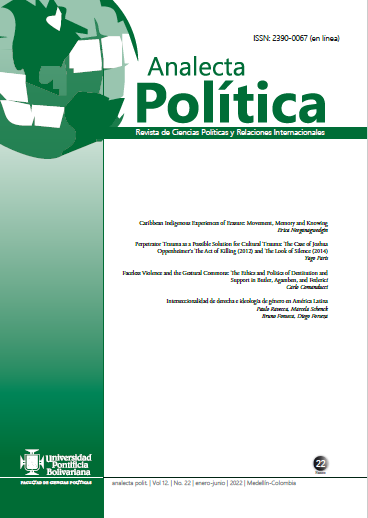Experiencias indígenas caribeñas de movimiento de borrado, memoria y conocimiento
Contenido principal del artículo
Resumen
El mundo caribeño ha experimentado un proceso de siglos de expansión europea en sus territorios. Este artículo describe el impacto dramático y la interrupción debido a la colonización y el imperialismo, y las formas en que estos sistemas entrelazados han dado forma a la comprensión del mundo taíno contemporáneo. Examina lo que significa recordar a nuestros antepasados taínos, sus historias que persisten y están in- crustadas en el tejido y el paisaje de las memorias caribeñas cotidianas, su cultura y sus formas de vida que impregnan muchos nombres, lugares y tierras caribeños. Este artículo examina, además, el discurso de la memoria y el conocimiento como formas y actuaciones de la presencia taína encarnada y la vida contemporánea.
Referencias
Archibald, J. (2008). Indigenous Storywork: Educating the Heart, Mind, Body, and Spirit. Vancouver: University of British Columbia Press.
BEx. (2020). Our people are not extinct: A reasoning with Kasike “Kalaan” Nibonrix Kaiman
| Bookman Express. Retrieved September 10, 2021, from https://bookmanexpress.pub/our-people-are-not-extinct-a-reasoning-with-kasike-kalaan-nibonrix-kaiman/
Bogado, A. (2015, October 12). Here’s the real story of Columbus that people prefer to ignore. Grist. https://grist.org/politics/heres-the-real-story-of-columbus-that-people-prefer-to-ignore/
Borrero, M. R. (2017). Making Peace with Atabeira in a Time of Climate Crises. Cutltural Survival Quarterly Magazine, December 2017. Retrieved September 10, 2021, from https://www.culturalsurvival.org/publications/cultural-survival-quarterly/making-peace-atabeira-time-climate-crises
Charles, C., & Cajete, G. A. (2020). Wisdom Traditions, Science and Care for the Earth: Pathways to Responsible Action. Ecopsychology. Volume 12, Number 2, Ecopsycho- logyVol. 12, No. 2 https://doi.org/10.1089/eco.2020.0020
Curet, L. A. (2002). The Chief Is Dead, Long Live... Who? Descent and Succession in the Protohistoric Chiefdoms of the Greater Antilles. Ethnohistory, 49(2), 259–280. https://doi.org/10.1215/00141801-49-2-259
C., Kiel, D., Phillips, K., Vigil, K. (n.d) Histories of Indigenous Sovereignty in Action: What is it and Why Does it Matter? | The American Historian. Retrieved September 10, 2021, from https://www.oah.org/tah/issues/2021/native-american-history-and-so-vereignty/histories-of-indigenous-sovereignty-in-action-what-is-it-and-why-does-it-matter/
Durán Matute, I. (2021). Indigeneity as a transnational battlefield: disputes over mea- nings, spaces and peoples. Globalizations, Volume 18, Issue 21, 256-272. https://doi.org/10.1080/14747731.2020.1771962
Ferbel-Azcarate, P. & Carpinelli, X., A. (n.d.) Caribbean Archaeology and Taino Survival.
Pp. 487-492 (n.d.). https://ufdc.ufl.edu/AA00061961/00844
Flint. V. I.J. (2019). Christopher Columbus - The fourth voyage and final years. In En- cyclopedia Britannica. https://www.britannica.com/biography/Christopher-Colum-bus/The-fourth-voyage-and-final-years
Forte, M. C (2006). Extinction: Ideologies Against Indigeneity in the Caribbean Southern Quarterly, Hattiesburg Vol. 43, Iss. 4, (Summer 2006): 46-69.
Gardner, W. J. (2020). A History of Jamaica. In Amazon. https://www.ama-zon.ca/History-Jamaica-William-James-Gardner/dp/1773750771/ref=asc_df_1773750771/?tag=googleshopc0c-20&linkCode=df0&hvadid=45951471997 7&hvpos=&hvnetw=g&hvrand=6766049378231148745&hvpone=&hvptwo=&hvqmt=&hvdev=c&hvdvcmdl=&hvlocint=&hvlocphy=9001077&hvtargid=pla-1021042354937&psc=1
Harkin, N. (2014). The Poetics of (Re)Mapping Archives: Memory in the Blood. JASAL: Journal of The Association for The Study of Australian Literature, 14(3).
Hernandez, A., Hafoka, ‘Inoke, ‘Ulu‘ave, L., & ‘Ulu‘ave-Hafoka, M. (2018). Talanoa: Tongan epistemology and Indigenous research method. AlterNative: An International Journal of Indigenous Peoples, 14(2), 156–163. https://doi.org/10.1177/1177180118767436
Henry, S., & Woodward, R. (2019). Contact and Colonial Impact in Jamaica: Compara- tive Material Culture and Diet at Sevilla la Nueva and the Taíno Village of Maima. Chapter 4 in Material Encounters and Indigenous Transformations in The Early Co- lonial Americas, Edited by C. L. Hofman & F. W. M. Keehnen, pages 84-101. Brill. Accessed from https://brill.com/view/book/edcoll/9789004273689/BP000004.xml
Hicks, J. (2007) Editorial, pp. 4-6 in Indigenous Affairs IWGIA Social Suffering 4/07. Re- trieved September 10, 2021, from https://www.iwgia.org/images/publications/IA_4_07.pdf
Kearney, A. (2012). Present Memories: Indigenous Memory Construct and Cross-Gene- rational Knowledge Exchange in Northern Australian; Keightley, E. (ed). Time, media and modernity. Palgrave Macmillan.
Kennedy, R., & Radstone, S. (2013). Memory up close: Memory studies in Australia. Me- mory Studies, 6(3), 237–244. https://doi.org/10.1177/1750698013486023
Koch, A., Brierley, C., Maslin, M. M., & Lewis, S. L. (2019). Earth system impacts of the European arrival and Great Dying in the Americas after 1492. Quaternary Science Reviews, 207, 13–36. https://doi.org/10.1016/j.quascirev.2018.12.004
Neeganagwedgin, E. (2015). Rooted in the Land: Taíno identity, oral history and stories of reclamation in contemporary contexts. AlterNative: An International Journal of Indigenous Peoples, 11(4), 376–388. https://doi.org/10.1177/117718011501100405
Ortiz Cintrón. J. H. (2018, August 8). Taínos: A Culture to Remember. Medium. https://medium.com/@viewpr/ta%C3%ADnos-a-culture-to-remember-b109a460880b
Porsanger J., I., Seurujärvi-Kari, & Lydia Nystad R.(2021) “Shared Remembering”
as a Relational Indigenous Method in Conceptualization of Sámi Women’s Lea- dership. (In Kristiina Virtanen, P; Pigga Keskitalo & T. Olsen (Eds), Indigenous Research Methodologies in Sámi and Global Contexts, 144–174. https://doi. org/10.1163/9789004463097_007
Pember, M. A. (1 C.E., November 30). Blood Memory. Daily Yonder. https://dailyyonder.com/blood-memory/2010/07/16/
Rampini, C. (1873). Letters from Jamaica, “The Land of Streams and Woods.” [By Charles J.G. Rampini.]. Edinburgh.
Reyes, N. A. S. (2017). A space for survivance: locating Kānaka Maoli through the re- sonance and dissonance of critical race theory. Race Ethnicity and Education, 21(6), 739–756. https://doi.org/10.1080/13613324.2017.1376632
Reynoso, V. (2017). How Capitalism and Spanish Imperialism Served as a Counterrevolu- tion to Taino Primitive Communism. Www.telesurenglish.net. Retrieved September 10, 2021, from https://www.telesurenglish.net/opinion/How-Capitalism-and-Spa-nish-Imperialism-Served-as-a-Counterrevolution-to-Taino-Primitive-Commu-nism-20170712-0013.html
Santana, C. (2017). Monstrous Anthropology. Third Text, 31(4), 567–580. https://doi.org/10.1080/09528822.2017.1403754
Rousseau, M., & Rousseau, S. (2018). Provisions: the roots of Caribbean cooking. Da Capo Press.
Santana, C. R. (n.d.). We Are Still Here: The First Taíno Movement Exhibition.
Retrieved September 10, 2021, from https://www.smithsonianmag.com/blogs/smithso-nian-latino-center/2019/10/15/we-are-still-here-first-taino-movement-exhibition/
Smith, H. (2019). Whatuora: Theorizing “New” Indigenous Research Methodology from “Old” Indigenous Weaving Practice. Art/Research International: A Transdisciplinary
Journal, 4(1), 1. https://doi.org/10.18432/ari29393
Linda Tuhiwai Smith. (2012). Decolonizing methodologies: research and indigenous peoples. Zed Books.
Silliman, S. W. (2005). Culture Contact or Colonialism? Challenges in the Archaeo- logy of Native North America. American Antiquity, 70(1), 55–74. https://doi.org/10.2307/40035268
Strecker, A. (2016). Revival, Recognition, Restitution: Indigenous Rights in the Eastern Caribbean. International Journal of Cultural Property, 23(2), 167–190. https://doi.org/10.1017/s0940739116000096
United Nations. (2007). United Nations Declaration on the Rights of Indigenous Peoples. Human Rights Quarterly, 33(3), 909–921. https://doi.org/10.1353/hrq.2011.0040
Vizenor. R. (1999). Manifest manners: postindian warriors of survivance. Wesleyan Uni- versity Press.
Wesley-Esquimaux, C. (2007). The intergenerational transmission of Historic Trauma and Grief. Pp. 6-12. In Indigenous Affairs IWGIA Social Suffering 4/7. Retrieved Septem- ber 10, 2021, from https://www.iwgia.org/images/publications/IA_4_07.pdf
Yelvington, A. K. (2000). Caribbean Crucible: History, Culture, and Globalization (2000). https://www.socialstudies.org/sites/default/files/publications/se/6402/640201. html






